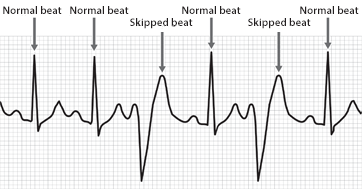When you take your pulse, you are counting your heart rate and feeling the heart rhythm.
- A normal rhythm has a regular, predictable beat, one after the other.
- An irregular beat is when the heart contracts early.
When the heart contracts early, there is not enough time for the ventricle (chamber) of the heart to fill up with blood before it contracts. This means that when it contracts, less blood than usual is pumped out to your body.
What Can Cause Irregular Beats?

ECG showing normal beats and skipped beats
Your heartbeat is controlled by electrical signals.
In a normal heart, these signals are started by a group of special cells called the Sino-Atrial Node (SA-Node).
However, other cells in the heart can also create electrical signals. If these other cells turn on and send out signals too early, they can interrupt the normal rhythm of the heart by causing it to contract early. This causes an irregular or “skipped” beat.
You may feel a skipped beat as a pause in the rhythm of your pulse. We can see this skipped beat in an ECG.
Read more about the electrical signals in your heart »
Many things can irritate the cells of the heart and cause a skipped beat. These include:
- caffeine
- smoking
- excessive alcohol or binge drinking
- stressful situations
- fatigue and illness
- hot and humid weather conditions
- cold and windy weather conditions
- not doing a proper warm-up before you do exercise
- exceeding your exercise prescription
What Should I Do If I Have Irregular Heart Beats?
- Report any irregular or skipped beats to your cardiovascular prevention & rehab team.
- Record these beats on your exercise diary:
- count the number of beats you feel over the 10 second count
- count the number of pauses you feel
- for example, if you felt 12 beats over 10 seconds and felt 1 pause, record it as 12 + 1.
- Cut back on your intake of caffeinated drinks such as tea, coffee and soda.
- Modify your exercise prescription if you have had an illness or symptoms. You can modify your exercise prescription by walking at a slower pace, shortening the distance that you walk, or both.
- Make sure you do a good cardiovascular warm-up before exercising.
- Get plenty of rest and relaxation.
When Should I Be Concerned About Irregular Heart Beats?
Most people, with or without heart disease, may experience skipped beats at some time. Occasional skipped beats are not a problem.
If you feel unwell or experience shortness of breath, light-headedness, dizziness or signs of angina when you have the skipped beats, contact your doctor for further advice.
Know the signs of angina »
Resources
